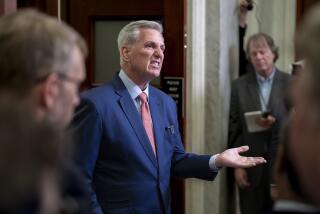House Leaders Cool to Social Security Freeze
- Share via
WASHINGTON — Both Republican and Democratic House leaders displayed little enthusiasm Thursday for freezing Social Security payments, despite President Reagan’s willingness to accept the one-year cap on Social Security benefits that Senate Republicans have been advocating for several weeks.
The House objections to a Social Security freeze point to a growing pessimism on Capitol Hill about the prospects for a budget compromise that would significantly slash the government’s mounting deficits. Adding to the fears of a stalemate over the budget are remarks by several Senate Republicans who object to capping next year’s defense budget at current levels.
House Majority Leader Jim Wright (D-Tex.) noted sarcastically that Reagan “seems to be under some strange illusion that an overpowering congressional mandate is going to force him to break his promise to protect the cost-of-living adjustment for the Social Security recipients.”
And House Minority Leader Robert H. Michel (R-Ill.) insisted through an aide that Social Security is “off the table” in budget discussions.
At his news conference Wednesday evening, Reagan denied that he had explicitly promised during last year’s election campaign to protect scheduled Social Security benefit increases, saying that he might approve a one-year freeze on such adjustments if he were “faced with an overwhelming bipartisan majority in both houses (of Congress) in support of that.”
Meanwhile, Senate Republicans, after meeting with senior Administration aides at the White House, suggested that “the chances are good” for an overall freeze on all federal pensions, and they continued to press for a limit on Social Security hikes.
Sen. Charles E. Grassley (R-Iowa), an ardent advocate of a comprehensive freeze on defense and domestic spending, said Reagan’s statement Wednesday night about Social Security “just adds a little more freedom . . . to Congress on what, maybe, we can do and he might accept.”
However, the White House continued to send mixed signals about Reagan’s intentions. Chief spokesman Larry Speakes reiterated that “the President’s campaign promise is his promise. He doesn’t want to tamper with Social Security.”
Responding to Wright’s comment in a morning television interview that Democrats are “going to help (Reagan) keep his promise to retirees,” Speakes noted dryly: “We’ve got a big tent here.”
As in past years, Social Security and defense are emerging as the key stumbling blocks in the effort to rein in budget deficits that otherwise are expected to exceed $225 billion a year through the rest of the decade.
On Wednesday, for instance, Senate Republicans got off to a rocky start in drafting an alternative to Reagan’s budget because of objections from advocates of a growing defense budget that an overall spending freeze might cripple the nation’s defense capabilities.
Defense Freeze
In a statement issued after Senate leaders met for about 2 1/2 hours behind closed doors, Sen. Barry Goldwater (R-Ariz.), chairman of the Armed Services Committee, argued that a defense freeze would require eliminating the “top 25 weapons programs” and said: “We obviously cannot cancel all of these programs without devastating our national security--but it illustrates how dangerous a defense spending freeze would be.”
Senate GOP leaders have been working on a budget plan that would incorporate an across-the-board spending freeze into a budget package that also would require an additional $36 billion in domestic spending cuts to pare the deficit to less than $100 billion in 1988.
By contrast, Reagan tentatively has agreed to a broad plan that would cut, eliminate or freeze dozens of domestic spending programs. But he has rejected proposals from his own advisers to drastically slow the pace of his defense buildup and has refused to initiate any changes in Social Security benefits. His preliminary budget estimates show a deficit of more than $140 billion in 1988, well above the goal of the Senate GOP leaders.
Tacit Support
Senate staff members said that Majority Leader Robert J. Dole (R-Kan.) and Budget Committee Chairman Pete V. Domenici (R-N.M.) still are pushing for the budget freeze with tacit support from Administration aides. Dole and Domenici argue that an across-the-board freeze is the only politically acceptable way to squeeze the deficit--but Senate staff members acknowledge that the chances of a budget stalemate are increasing.
More to Read
Get the L.A. Times Politics newsletter
Deeply reported insights into legislation, politics and policy from Sacramento, Washington and beyond. In your inbox three times per week.
You may occasionally receive promotional content from the Los Angeles Times.










